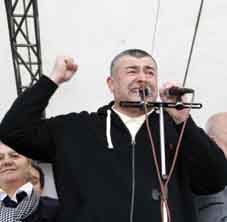Opposition’s “final wave” of protests begins
By Mzia Kupunia
Wednesday, April 22

Along with holding continual protest rallies, the opposition has said they will set up a “cell ghetto” all along Rustaveli Avenue, from Freedom Square to the end of the street. One of the opposition leaders, former Presidential candidate against Saakashvili Levan Gachechiladze, said that on Wednesday the cells would be erected around the Mayor’s Office, the State Chancellery Building and the Parliament building. Levan Gachechiladze’s brother Giorgi Gachechiladze, more widely known as “Utsnobi” (unknown) will be organizing this. Giorgi Gachechiladze, as the “prisoner” in the TV reality show Cell Number 5, came to the rally today for the first time as a further protest against President Saakashvili.
As part of the third wave the organizers of the April 9 demonstrations have started collecting supporters in Georgia’s regions and bringing them to Tbilisi. Representatives of the National Forum have gone to Imereti, Kakheti and Adjara saying they will bring “tens of thousands” of their supporters to the capital.
Although the number of people attending the “third wave” rally was significantly less than on the first days of the demonstrations, and although the Government has reiterated that the Presidential elections will only be held in 2013, the opposition remain confident that they will reach their goal. “The Georgian people will end the unjust regime that Saakashvili has imposed on the country,” Saakashvili’s former ally, the ex-Parliament Speaker and prominent opposition leader Nino Burjanadze told several thousand gathered in front of the Parliament building on Tuesday. “We will act within the law and constitution and will be successful… the people will win,” the leader of the Democratic Movement-United Georgia added.
Former Ambassador to the UN and leader of the Alliance for Georgia Irakli Alasania said at the rally that by standing together the Georgian people had defused the Government’s hopes. Alasania said that “many thought” the protest would last no more than a week. “Today once more it is demonstrated that we have a goal it is impossible to retreat from. We want to be the sons of a strong and democratic Georgia and will stand firmly to reach this goal,” Alasania told opposition supporters. He stressed that the “Georgian people” will reach this goal by constitutional means.
The Georgian authorities have responded by saying that politicians should learn to talk to each other. Georgian Parliament Speaker David Bakradze said on Tuesday that “politicians should not create problems for the country because of their personal problems.” Bakradze noted that the fact that the opposition refuses to start a dialogue should not become a deterrent to carrying out reforms in the country. “The Government will carry on dialogue with other opposition forces, the ones which are willing to hold a dialogue,” Bakradze told journalists yesterday.
Political analysts suggest that both the opposition and the authorities should now demonstrate “consciousness”. Commentator Soso Tsiskarishvili said the side less conscious of the mood of the times will be the loser. Tsiskarisvhili told The Messenger that the opposition and Government are both making “emotional” statements, however the opposition has not presented a plan of how things will develop in case Saakashvili resigns. “The opposition should present its plan to the public,” Tsiskarishvili said. On the other hand the Government is insisting that it will not resign and that the next elections will be held in 2013. “Although the Government has not presented anything so far that shows how it intends to stay in office, it seems that it is unable to take steps acceptable for Georgian citizens independently from the opposition,” Tsiskarishvili stated, adding that “if the Government does not take such steps, it will deliver its own death sentence.”
As for the possibility of using force against demonstrators, about which the opposition has been talking since the start of the rallies, Tsiskarishvili noted that there are some people around Saakashvili who are less patient than the President himself. He suggested that those people would force Saakashvili to take some measures, and these would be implemented either in Akhalgori or on Rustaveli Avenue. “In both cases this would have grave consequences for the current Government,” Tsiskarishvili told The Messenger.
